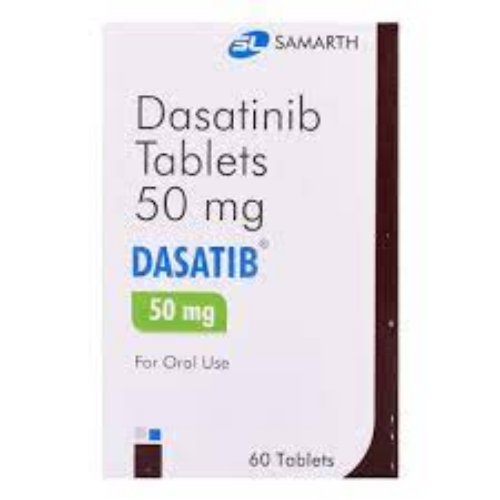Product Intro:
Dasatib is designed to target BCR-ABL and other kinases responsible for cancer progression in CML and Ph+ ALL. It helps control the proliferation of malignant white blood cells, improving disease outcomes in resistant or newly diagnosed patients. Available in tablet form, it allows convenient oral administration.
Uses (Indications):
Dasatib is primarily used for:
-
Chronic Myeloid Leukemia (CML) – chronic, accelerated, or blast phases, especially if resistant or intolerant to imatinib.
-
Philadelphia Chromosome-positive Acute Lymphoblastic Leukemia (Ph+ ALL) – treatment of newly diagnosed and relapsed cases.
-
CML in pediatric patients (where approved).
-
Off-label uses in certain cancers under research.
Storage Instructions:
- Store at 20°C to 25°C (room temperature).
- Protect from moisture and light.
- Keep tablets in the original packaging until use.
- Keep out of reach of children.
How It Works (Mechanism of Action):
Dasatinib inhibits multiple tyrosine kinases, including BCR-ABL fusion protein, SRC family kinases, c-KIT, and PDGFR, blocking signaling pathways that promote cancer cell survival and proliferation. This leads to cancer cell death and control of disease progression in leukemias.
Side Effects:
Common Side Effects:
- Fatigue
- Nausea and vomiting
- Diarrhea
- Headache
- Muscle pain
- Rash
Serious Side Effects:
- Myelosuppression (low blood cell counts)
- Fluid retention causing pleural or pericardial effusions
- QT interval prolongation leading to abnormal heart rhythms
- Pulmonary arterial hypertension (rare)
- Bleeding events
- Liver function abnormalities
Dosage (Typical Recommended Dose):
-
Chronic Phase CML:
100 mg once daily orally.
-
Accelerated or Blast Phase CML and Ph+ ALL:
140 mg once daily orally (may be divided doses as per doctor’s advice).
Dosage adjustments may be required based on tolerance and side effects.
Method of Administration:
- Take tablets orally, with or without food.
- Swallow tablets whole with water; do not crush, chew, or break.
- Take at the same time daily to maintain steady blood levels.
Precautions:
- Monitor complete blood counts regularly to detect myelosuppression.
- Watch for signs of fluid buildup (shortness of breath, swelling).
- Caution in patients with cardiac disorders due to risk of QT prolongation.
- Use effective contraception during and after treatment (pregnancy category D).
- Avoid breastfeeding.
- Regular liver function and electrolyte monitoring recommended.
Drug Interactions:
- Strong CYP3A4 inhibitors (e.g., ketoconazole) can increase dasatinib levels.
- CYP3A4 inducers (e.g., rifampin) may decrease its effectiveness.
- Antacids and proton pump inhibitors can reduce absorption – separate administration times.
- QT prolonging drugs should be avoided due to additive cardiac risks.
- Inform your doctor about all other medications and supplements.
Allergies (Warnings for Allergic Reactions):
- Rare hypersensitivity reactions may include rash, swelling, breathing difficulties.
- Discontinue and seek emergency care if severe allergic symptoms occur.
Overdose Information:
- Symptoms may include severe nausea, vomiting, myelosuppression, heart rhythm issues.
- No specific antidote exists; supportive treatment and monitoring in hospital required.
Missed Dose Instructions:
- If a dose is missed, take it as soon as possible unless it’s close to the next scheduled dose.
- Do not double doses to compensate.
- Contact your healthcare provider if multiple doses are missed.
Additional Notes:
- Patients should avoid grapefruit juice as it can increase dasatinib levels.
- Adherence to daily dosing is critical for effectiveness.
- Report symptoms like persistent cough, chest pain, easy bruising, or bleeding immediately.
- Regular ECG monitoring may be necessary to watch for cardiac side effects.




